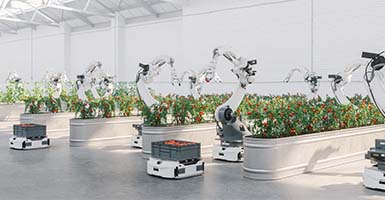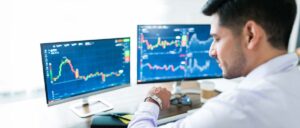Franklin Templeton Institute examines the challenge of feeding a growing global population in the midst of climate change, geopolitical shocks and uncertainty. Head of the Institute, Stephen Dover, looks at the future of food and the innovation and technology that will be needed to safely produce and distribute the food we need from the perspective of an investor.
I am not an expert on climate change. Therefore, I will leave it to those experts and environmental, social and governance (ESG) specialists to talk in detail about the impacts of climate change on our food system and which government policies are required to address or decrease impacts. I am looking at the future of food and the innovation and technology that will be needed to safely produce and distribute the food we need from the perspective of an investor. That said, it is clear the food system—which makes up 10% of the global economy—is increasingly a major driver of climate change, and at the same time is disrupted by climate change. This disruption will impact global investors across asset classes—in equities alone, food makes up US$4.9 trillion or approximately 4% of global market capitalization. So, it’s critical that we think about how investors respond—whether they focus on ESG or not—to identify opportunities in the market and potentially avoid risk that could materially impact their portfolios.
I have some history in agriculture being from a fourth-generation ranching family in Montana. Anyone associated with a ranching family gains a lifelong education on the food supply chain, commodity prices, and the challenges ranchers and farmers face every day to get their product—whether it’s a cow or a bushel of wheat—to market. Despite this experience, I am somewhat surprised by the level of sophistication in today’s food business. Food is no longer a story just about land, water and weather; it is a story about technology, innovation and the future. It’s clear to me that food innovation, and the future of food production, will play a major role in markets over the coming decades.
Three reasons food matters for investors
- Food industry innovation requires innovation in financing
So, what does this mean for investors? In my view, three main points. First, innovation in the food industry must be financed. Whether it be funding for improving traditional farmers’ production, the move to high-efficiency indoor agriculture, startups developing alternative proteins, or helping companies build supply-chain resilience, all will require large capital inputs from equity, fixed income, and private markets. And, if we’re expecting the food industry to innovate, the asset management industry must also innovate to create investment vehicles to address these large-scale changes. This may require rethinking traditional funding models, including the duration and types of loans, direct impactful investing and aligning investments to long-term sustainability goals, such as the UN Sustainable Development Goals (SDGs). And, due to the significant impact agriculture has on greenhouse gas emissions, it is critical that carbon trading and carbon markets develop as soon as possible.
- Investors should consider unintended consequences
Second, the food system is highly complex and interconnected, and deployments of capital must consider unintended consequences (read: negative externalities). Changes in the system create ripple effects that have long-term impacts and can lead to severe disruptions. We’ve seen these disruptions during the COVID-19 pandemic. One ripple effect I have seen firsthand is how the change in diet in China has affected the health of Chinese people and the environment globally. When I first started traveling to China in the early 1980s, most of the diet was plant based with just a small amount of meat—usually pork. In the early 1980s, the average per-capita consumption of meat was just over 13 kg per year. Obesity, diabetes and other diet-related diseases were rarely reported during the 1980s in China. With the opening of China’s economy and subsequential rise in average incomes and a growing middle class over the last few decades, meat consumption now hovers over 60 kg per year. The significant increase in meat in the Chinese diet corresponds to a nearly 7x increase in beef consumption since 1990. Increasing appetite for beef in China is linked to accelerating deforestation of the world’s greatest carbon sink, the Amazon rainforest, where many cattle are now being raised.
The change in diet is not limited to meat—we’re seeing increased consumption of sugar and fat, resulting in significant increases in type 2 diabetes in China’s populace. Less than 1% of China’s population suffered from type 2 diabetes in 1980; that number is now close to 12% in 2022— in raw numbers, roughly a jump from fewer than 10 million to over 170 million people. This increase has economic ramifications. In 2015, it was estimated that type 2 diabetes generated US$1.32 trillion of negative impact on the global economy, and, by 2030, it is estimated to have a negative impact of US$2.25 trillion–US$2.5 trillion. With the world’s largest population, China leads the globe in financial loss from type 2 diabetes. That loss is projected to grow to consume 3%–5% of China’s forecasted 2030 gross domestic product (GDP). As China becomes a larger segment of the emerging market index—and it really should be considered a developed market, in my opinion—this could have a significant impact on investors’ assets going forward.
- We need better financial incentives and environmental impact measurements
Third, as we invest in innovation to help reduce negative externalities, a market-based approached where we more effectively measure and price environmental impact will be necessary. More directly: the economic value of natural systems and the risks to these systems’ further degradation must be accounted for in asset pricing. To give context, the World Economic Forum (WEF) and PricewaterhouseCoopers (PwC) have estimated that more than half of global GDP, is moderately to highly dependent on natural systems under threat—essentially, half of global GDP has significant risk exposure to changes in nature. Like me, I expect that number may make you gasp. However, for investors, there is opportunity on the other side of this equation. The opportunity is to help fund the global economy’s transition to a nature-positive economy—which the WEF has defined as “enhancing the reliance of our planet and societies to halt and reverse nature loss.” It is estimated this transition will generate US$10 trillion in additional business revenue and cost savings and over 395 million jobs by 2030—of which US$3.6 trillion and 191 million jobs are directly related to changing the food system. Examples in the food sector include funding regenerative agriculture; creating sustainable and healthy fisheries; stopping biodiversity loss (food production is one of the leading contributors); reducing food waste; and creating efficient, transparent and sustainable supply chains.
Franklin Templeton Key risks & Disclaimers:
Important Legal Information
This material is intended to be of general interest only and should not be construed as individual investment advice or a recommendation or solicitation to buy, sell or hold any security or to adopt any investment strategy. It does not constitute legal or tax advice.
The views expressed are those of the investment manager and the comments, opinions and analyses are rendered as of publication date and may change without notice. The information provided in this material is not intended as a complete analysis of every material fact regarding any country, region or market.
Data from third party sources may have been used in the preparation of this material and Franklin Templeton (“FT”) has not independently verified, validated or audited such data. FT accepts no liability whatsoever for any loss arising from use of this information and reliance upon the comments, opinions and analyses in the material is at the sole discretion of the user.
Products, services and information may not be available in all jurisdictions and are offered outside the U.S. by other FT affiliates and/or their distributors as local laws and regulation permits. Please consult your own professional adviser or Franklin Templeton institutional contact for further information on availability of products and services in your jurisdiction.
Issued in the U.S. by Franklin Templeton Distributors, Inc., One Franklin Parkway, San Mateo, California 94403-1906, (800) DIAL BEN/342-5236, franklintempleton.com—Franklin Templeton Distributors, Inc. is the principal distributor of Franklin Templeton’s U.S. registered products, which are not FDIC insured; may lose value; and are not bank guaranteed and are available only in jurisdictions where an offer or solicitation of such products is permitted under applicable laws and regulation.
CFA® and Chartered Financial Analyst® are trademarks owned by CFA Institute.
What are the risks?
All investments involve risks, including possible loss of principal. The value of investments can go down as well as up, and investors may not get back the full amount invested. Brokerage commissions and ETF expenses will reduce returns. ETF shares may be bought or sold throughout the day at their market price on the exchange on which they are listed. ETFs trade like stocks, fluctuate in market value and may trade above or below the ETF’s net asset value. However, there can be no guarantee that an active trading market for ETF shares will be developed or maintained or that their listing will continue or remain unchanged. While the shares of ETFs are tradable on secondary markets, they may not readily trade in all market conditions and may trade at significant discounts in periods of market stress.
MeDirect Disclaimers:
This information has been accurately reproduced, as received from Franklin Templeton Investment Management Limited (FTIML). No information has been omitted which would render the reproduced information inaccurate or misleading. This information is being distributed by MeDirect Bank (Malta) plc to its customers. The information contained in this document is for general information purposes only and is not intended to provide legal or other professional advice nor does it commit MeDirect Bank (Malta) plc to any obligation whatsoever. The information available in this document is not intended to be a suggestion, recommendation or solicitation to buy, hold or sell, any securities and is not guaranteed as to accuracy or completeness.
The financial instruments discussed in the document may not be suitable for all investors and investors must make their own informed decisions and seek their own advice regarding the appropriateness of investing in financial instruments or implementing strategies discussed herein.
If you invest in this product you may lose some or all of the money you invest. The value of your investment may go down as well as up. A commission or sales fee may be charged at the time of the initial purchase for an investment. Any income you get from this investment may go down as well as up. This product may be affected by changes in currency exchange rate movements thereby affecting your investment return therefrom. The performance figures quoted refer to the past and past performance is not a guarantee of future performance or a reliable guide to future performance. Any decision to invest in a mutual fund should always be based upon the details contained in the Prospectus and Key Investor Information Document (KIID), which may be obtained from MeDirect Bank (Malta) plc.





